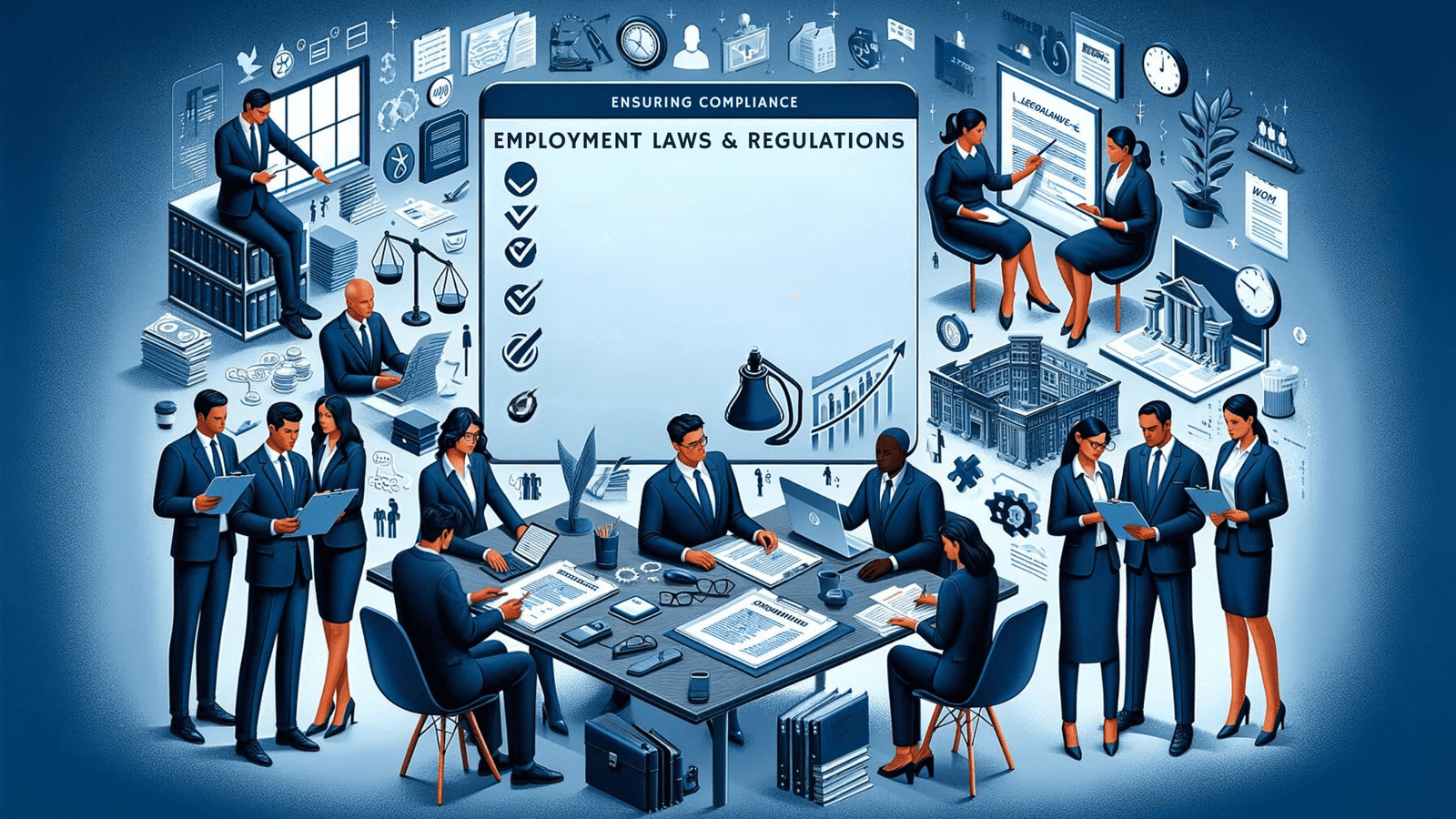Effective HR management is crucial for the success of small and medium-sized enterprises (SMEs). It plays a vital role in attracting and retaining top talent, creating a positive company culture, and developing effective performance management systems. By implementing technology solutions, such as automating HR processes and utilizing HR analytics, SMEs can streamline their HR management practices and make data-driven decisions. Building strong employee relations through open communication and employee engagement is also essential for SMEs. Lastly, ensuring compliance with employment laws and regulations by understanding labor laws and implementing fair and equitable HR policies is necessary to protect both the company and its employees.
Key Takeaways
- Effective HR management is crucial for the success of SMEs.
- Attracting and retaining top talent is a key focus of HR management.
- Creating a positive company culture is important for employee satisfaction and productivity.
- Implementing technology solutions can streamline HR processes and enable data-driven decision-making.
- Building strong employee relations through open communication and engagement is essential.
The Importance of HR Management in Small and Medium-Sized Enterprises

Attracting and Retaining Top Talent
Attracting and retaining top talent is crucial for the success of small and medium-sized enterprises (SMEs). In a competitive job market, SMEs need to showcase their unique selling points to attract the best candidates. One effective way to do this is by offering a comprehensive employee onboarding program that ensures a smooth transition for new hires. This program can include customizable profile templates and modules for tasks such as asset tracking and absence management.
Additionally, SMEs can prioritize employee wellness to create a positive work environment. By incorporating wellness videos and pamphlets into a comprehensive health program, SMEs can demonstrate their commitment to the well-being of their employees.
To further enhance employee engagement and development, SMEs can implement an employee training program. This program can include orientation plans to help new employees quickly adjust to their roles and responsibilities.
In summary, attracting and retaining top talent requires SMEs to invest in employee onboarding, wellness programs, and training initiatives to create a positive and supportive work environment.
Creating a Positive Company Culture
Creating a positive company culture is essential for the success of any small or medium-sized enterprise (SME). A positive company culture fosters a sense of belonging and engagement among employees, leading to increased productivity and employee satisfaction.
To create a positive company culture, SMEs can:
- Foster open and transparent communication: Encourage employees to share their ideas, concerns, and feedback openly. This promotes a culture of trust and collaboration.
- Recognize and reward employees: Acknowledging and appreciating employees’ hard work and achievements boosts morale and motivation.
- Provide opportunities for growth and development: Offering training programs and career advancement opportunities shows employees that their growth is valued.
Tip: Building a positive company culture takes time and effort. It requires consistent communication, support from leadership, and a commitment to creating a supportive and inclusive work environment.
Developing Effective Performance Management Systems
Developing effective performance management systems is crucial for small and medium-sized enterprises (SMEs) to ensure the productivity and success of their workforce. A well-designed performance management system provides a structured framework for setting goals, evaluating performance, and providing feedback to employees.
One approach to developing an effective performance management system is to establish clear and measurable performance metrics. By defining specific goals and objectives, SMEs can align employee performance with organizational objectives. This helps employees understand their role in contributing to the overall success of the company.
In addition to setting goals, it is important for SMEs to regularly monitor and evaluate employee performance. This can be done through regular performance reviews or check-ins. By providing timely feedback and guidance, SMEs can help employees improve their performance and address any issues or challenges they may be facing.
Another important aspect of developing effective performance management systems is fostering a culture of continuous learning and development. SMEs can encourage employees to enhance their skills and knowledge through training programs, mentorship opportunities, and career development plans. This not only benefits individual employees but also contributes to the overall growth and success of the organization.
Overall, developing effective performance management systems is essential for SMEs to optimize employee performance, drive productivity, and achieve their business goals.
Implementing Technology Solutions for HR Management

Automating HR Processes
Automating HR processes can greatly streamline and optimize HR management functions within small and medium-sized enterprises (SMEs). By implementing AI HRMS (Artificial Intelligence Human Resource Management Software), companies can achieve greater efficiency and accuracy in various HR tasks. Some of the functions offered by AI HRMS include:
- Employee onboarding: Providing the best possible experience for new hires by managing core human resources with customizable profile templates and modules like absence management, asset tracking, and employee
- Custom HRMS solutions: Tailoring HRMS solutions to meet the specific needs of SMEs, ensuring that the software aligns with their unique HR processes and requirements.
- Pricing: Offering flexible pricing options to accommodate the budget constraints of SMEs.
Automating HR processes not only saves time and reduces manual errors, but it also allows HR professionals to focus on more strategic initiatives, such as talent development and employee engagement. With AI HRMS, SMEs can effectively manage their HR functions and enhance overall organizational performance.
Utilizing HR Analytics for Data-Driven Decision-Making
HR analytics is a powerful tool that enables small and medium-sized enterprises (SMEs) to make data-driven decisions when it comes to managing their workforce. By analyzing HR data, such as employee performance, engagement, and turnover rates, SMEs can gain valuable insights into their workforce dynamics.
One way to utilize HR analytics is by implementing a dashboard that provides real-time visualizations of key HR metrics. This allows HR managers to easily track and monitor important indicators, such as employee satisfaction, productivity, and retention. With this information at their fingertips, SMEs can identify trends, patterns, and areas for improvement.
In addition to tracking metrics, HR analytics can also help SMEs identify potential issues or risks before they become major problems. For example, by analyzing data on employee turnover, an SME can identify departments or teams with higher turnover rates and take proactive measures to address the underlying issues.
Furthermore, HR analytics can assist SMEs in making informed decisions about talent acquisition and development. By analyzing data on recruitment sources, hiring success rates, and training effectiveness, SMEs can optimize their hiring and training processes to attract and retain top talent.
In summary, utilizing HR analytics empowers SMEs to make data-driven decisions, improve workforce management, and drive business success.
Building Strong Employee Relations

Promoting Open Communication
Open communication is essential for fostering a collaborative and inclusive work environment. It allows employees to freely express their ideas, concerns, and feedback, leading to improved teamwork and innovation. Transparency plays a crucial role in promoting open communication, as it builds trust and credibility among employees. By sharing information about company goals, strategies, and decisions, organizations can ensure that everyone is on the same page and working towards a common objective.
To promote open communication, organizations can:
- Encourage regular team meetings where employees can openly discuss their projects, challenges, and ideas. These meetings provide a platform for sharing knowledge, brainstorming, and problem-solving.
- Implement a suggestion box or feedback system where employees can anonymously provide suggestions, and feedback, or raise concerns. This allows employees to voice their opinions without fear of judgment or reprisal.
Tip: Encourage managers and supervisors to actively listen to their employees and create a safe space for open dialogue. This will foster trust and encourage employees to speak up and share their thoughts and ideas.
Encouraging Employee Engagement
Encouraging employee engagement is crucial for creating a positive work environment and fostering productivity. Here are some strategies to promote employee engagement:
- Foster a culture of open communication: Encourage employees to share their ideas, concerns, and feedback openly. This can be done through regular team meetings, suggestion boxes, or anonymous surveys.
- Provide opportunities for growth and development: Offer training programs, workshops, and mentorship opportunities to help employees enhance their skills and advance in their careers.
- Recognize and reward achievements: Acknowledge and appreciate employees’ hard work and accomplishments. This can be done through employee recognition programs, performance bonuses, or public appreciation.
- Promote work-life balance: Encourage employees to maintain a healthy work-life balance by offering flexible work arrangements, wellness programs, and time-off policies.
- Foster a sense of belonging: Create a supportive and inclusive work environment where employees feel valued, respected, and included. This can be achieved through team-building activities, diversity and inclusion initiatives, and employee resource groups.
By implementing these strategies, companies can enhance employee engagement, boost morale, and improve overall organizational performance.
Ensuring Compliance with Employment Laws and Regulations

Understanding and Adhering to Labor Laws
AI HRMS (Human Resource Management Software) is designed for companies seeking an effective solution for their HR needs. Developed over decades of assisting with HR matters, we know the uphill struggle businesses face in retaining top talent, thereby leading to the creation of AI HRMS.
An embodiment of cloud-based HR management solutions, AI HRMS provides a myriad of comprehensive functions and is easily customizable as per individual needs. Its application, though global, is specifically oriented towards supporting millions of small to medium-sized organizations faced with human resource challenges.
- Employee Onboarding: Provide the best possible experience for new hires. Manage core human resources with customizable profile templates and modules like absence management, asset tracking, and employee
Implementing Fair and Equitable HR Policies
Implementing fair and equitable HR policies is crucial for creating a positive work environment and ensuring equal opportunities for all employees. It is important to establish clear guidelines and procedures that promote fairness and prevent discrimination.
One effective way to ensure fairness is by implementing a transparent compensation system that is based on objective criteria such as job responsibilities, skills, and experience. This helps to eliminate bias and ensure that employees are rewarded fairly for their contributions.
Additionally, it is important to provide employees with clear channels for reporting any concerns or grievances they may have. This can be done through an anonymous reporting system or by designating a trusted HR representative who can address and resolve issues confidentially and impartially.
By implementing fair and equitable HR policies, organizations can foster a culture of trust and inclusivity, which ultimately leads to higher employee satisfaction and productivity.
Ensuring compliance with employment laws and regulations is crucial for any organization. It not only helps protect the rights of employees but also ensures a fair and ethical work environment. At AI HRMS, we understand the importance of compliance and have developed state-of-the-art Human Resource Management Software (HRMS) that can help your company stay on top of all the legal requirements. Our software is designed to streamline HR processes, automate compliance tasks, and provide real-time updates on changes in employment laws. With AI HRMS, you can ensure that your company is always in compliance, avoiding costly penalties and legal issues. Take the first step towards a compliant and efficient HR department by visiting our website and exploring the features of AI HRMS. Join the future of HR management today!
Conclusion
In conclusion, the transformation of HR management for small and medium-sized enterprises is crucial for their success and growth. By adopting modern HR practices and leveraging technology, SMEs can streamline their HR processes, improve employee engagement, and attract top talent. SMES need to prioritize investing in HR systems and training their HR teams to effectively manage their workforce. With the right HR strategies in place, SMEs can create a positive work environment, foster employee development, and ultimately achieve their business goals.
Frequently Asked Questions
What is the role of HR management in small and medium-sized enterprises?
HR management plays a crucial role in small and medium-sized enterprises by attracting and retaining top talent, creating a positive company culture, and developing effective performance management systems.
How can technology solutions help in HR management for small and medium-sized enterprises?
Technology solutions can automate HR processes, such as payroll and employee onboarding, and provide HR analytics for data-driven decision-making.
Why is promoting open communication important for building strong employee relations?
Promoting open communication helps foster trust, collaboration, and transparency within the organization, leading to stronger employee relations and higher employee engagement.
What are some key labor laws that small and medium-sized enterprises need to understand and adhere to?
Small and medium-sized enterprises need to understand and adhere to labor laws related to minimum wage, overtime, anti-discrimination, and employee benefits.
How can small and medium-sized enterprises implement fair and equitable HR policies?
Small and medium-sized enterprises can implement fair and equitable HR policies by ensuring equal opportunities, providing a safe and inclusive work environment, and establishing transparent processes for promotions and rewards.
What are the benefits of employee engagement for small and medium-sized enterprises?
Employee engagement leads to increased productivity, higher job satisfaction, improved employee retention, and positive work culture, all of which contribute to the overall success of small and medium-sized enterprises.








